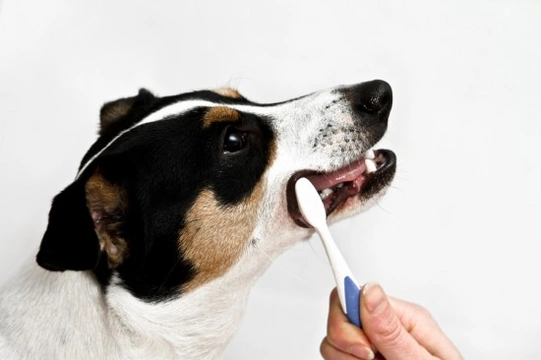
Dental care for dogs
You might not think it, but your best friend needs his teeth caring for just as much as you do! Canine dental care, is often overlooked and while many people just seem to expect that dogs just have bad breath, this need not be the case.
Digestion of food starts with the teeth and the mouth so a good set of gnashers is essential to your dogs health! The best way to get to grips with this, is to know what a happy set of teeth should look like. Of course, it helps if your dog is accommodating in this task, so start them at a young age, getting used to you or your vet having a quick peek into their mouths. It is essential that you do this as gently as possible to minimise the risk of nervous nips.
A healthy set of teeth will of course be white, and may have a slight yellow tinge to them. The breath may have a certain odour to it, but it should not be so unpleasant as to knock your socks off! The gums should be a healthy colour, with plenty of blood flow to them. By checking the teeth and gums on a regular basis, you will get to know what is normal for your dog and regular checks will highlight any issues. Problem signs to look out for include:
- Halitosis - very offensive breath, which can have a number of underlying issues
- Difficulty chewing and/or an increase in salivation
- Bleeding, sore or puffy gums
- Build up of plaque or tartar (brown deposits on the teeth)
- Missing or loose teeth
Plaque buildup on the teeth can turn into tartar and cause a number of issues. Bacteria can grow within these areas and can have a devastating impact on the gums as well as the teeth. Tooth and gum disease can cause loss of teeth, pain and the dreaded halitosis as well as research showing that it also has an impact or implication within many diseases involving the heart, kidneys and other major organs. Prevention is better than a cure, and the earlier you spot signs of dental disease, the better for your dog and your wallet!
With prevention of dental disease at the forefront, a regular routine of oral care is paramount. Started when your dog is a pup, it will soon get used to having his teeth brushed. Yes - dogs have toothbrushes! They are usually rubber 'finger brushes' which pop on your finger, having soft rubber bristles around them. Use the same technique you would for yourself, all surfaces and areas need to be covered (ask your vet to show you if in doubt) and it is important that you use the correct toothpaste. Under NO circumstances should you use toothpaste formulated for humans as it could make him very ill indeed. Canine toothpaste can be obtained from your vet.
In addition to this, special dental treats can be bought which are shaped to maximise the chewing action your dog does naturally when he eats. The shaped and composition of the treat is such that the active ingredients help reduce the buildup of tartar when chewed. A pleasurable experience for your dog, and they won't even know you are helping protect their pearly whites!
Lastly, ask your vet the check your dogs teeth whenever he needs to visit the vet. Your vet will not mind and will usually do this anyway as part of a basic health check.



